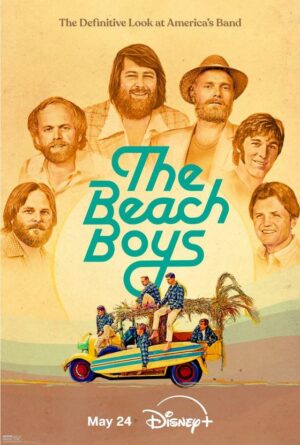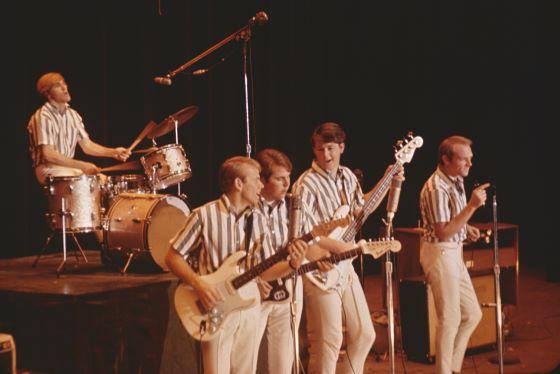

[Rating: Swiss Fist]
Streaming on Disney+ Friday, 5/24
A linear hagiography that coasts on the basic facts of a story already told, The Beach Boys is approachable and harmless in all the ways toothless creatures tend to be. Unfolding with all the ease and faux complexity of an archived episode of VH1’s Behind the Music, the documentary assembles the story of the eponymous band as if with Lincoln Logs, slotting each piece of the story into a predictable structure whose presentational neatness belies its uninspired construction.
The doc doesn’t want for access to the principal members of the band itself, with a mix of contemporary interviews and archive recordings with nearly all members of The Beach Boys throughout the years. This includes the reclusive Brian Wilson, his brothers Dennis and Carl, cousin Mike Love, and friend Al Jardine (along with a host of other one-time members). The band tells their own story in this way, walking the audience through their formation during their teenage years and early successes at the dawn of the 1960s.
The documentary follows the pop group’s rise to international fame, its “rivalry” with The Beatles, their split into touring vs. recording entities, popular decline, and eventual return to cultural relevance (despite some questionable “Kokomo” erasure). The band’s struggle to find a place in the musical landscape of the 1970s and legal squabbles are woven into the broader story that spans just a touch over 110 minutes, yet any exploration of the darker or complicated bits (especially the details of Dennis Wilson’s final days) are bypassed. Indeed, this is a straight A-to-B accounting of The Beach Boys that acts as a primer for anyone just looking for the basic outline of their story, and little more.

Directors Frank Marshall and Thom Zimny seem content to just scrape the surface of their project’s most engaging portions with little more than a mention of the notables. It’s enough for them to simply comment on the band’s connection to Charles Manson, their last-minute withdrawal from the Monterey Pop Festival, or the innovations of Pet Sounds rather than delve into any of this with something resembling depth. The fact that the band’s musical contemporaries were all inspired by their work yet managed to transition into the zeitgeist of the late 60s while The Beach Boys remained culturally stagnant is perhaps the documentary’s (and pop culture’s) most puzzling question, and it gets all of two minutes, here.
Anyone looking for insight into the ways the band (and Brian Wilson in particular) innovated by way of double tracking vocals or layering instrumentals in the studio will be disappointed with the documentary’s refusal to probe further into these arenas. And while the doc trots out Lindsey Buckingham for a some collegial perspective, and Janelle Monáe as an expert witness, there’s a surprising lack of bona fides when it comes to the talking heads deployed, here. What commentary exists is there just to lionize the band and their accomplishments, with any critical examination pushed aside to get the basics of the story out in under two hours.

As a documentary, The Beach Boys does a serviceable job outlining the wheres, whys and how-tos of one American music group during the mid/late 20th century, but the band itself is somewhat unapproachable in this telling. There’s no asking, here, just telling, which clips the creative wings on the exploration of a band with a near-limitless ocean of musical and dramatic potential: one that tracks not just one journey through the ringer of fame, but an industry’s transformation parallel to a cultural revolution. The documentary might mention these ideas, but it never explores how The Beach Boys did/still do inform generations of artists musically, historically, and emotionally.
Maybe Marshall and Zimny just assumed Love and Mercy covered all of that, and wanted something that could play to grade school music classes on substitute teacher day. If that’s the intent, there’s plenty to enjoy and even toe-tap along to, as the music laid over the interviews tells a seemingly “complete” story with brisk efficiency. The different talking heads are peppered throughout the doc well, and weave in the story of the band and the broad strokes of their rise-fall-rise in a consumable fashion.
There’s just so much more story available for dissection than what’s being presented here, along with a mountain of unexplored contextualization for and from the band’s peers and successors. The Beach Boys deserve so much more than this simple yet tasteful recap, and the more one is familiar with the group and their story, the deeper this failure is felt. It might have required more than two hours, or even a series to explore the rich veins of musical innovation, historical significance, and cross-cultural relevance, but the potential for such a project is…well, God only knows…





Comments on this entry are closed.